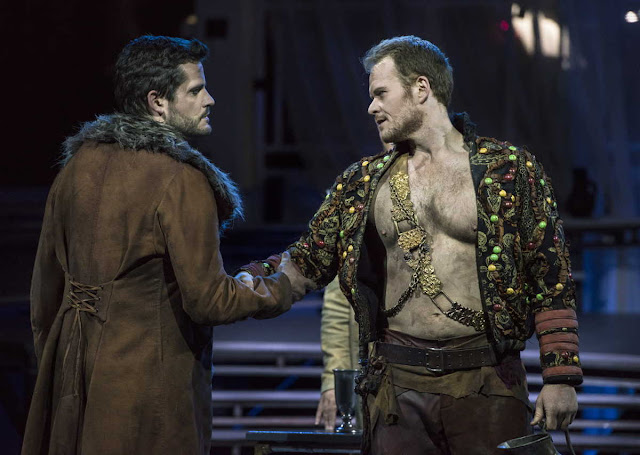 |
| David McFerrin & Duncan Rock in "The Rape of Lucretia" (photo: Liza Voll) |
The operas of Benjamin Britten can be accessible in some
cases (such as Peter Grimes or Billy Budd), or they
can be more challenging, such as Death in Venice . In the
latter category, The Rape of Lucretia stands out, and it
remains a rarely performed chamber opera by Britten. It is the
current offering by Boston Lyric Opera, at the Artists for Humanity
EpiCenter in South Boston. First performed at Glyndebourne in 1946,
it's more along the lines of his Turn of the Screw in style
and scope. Though the composer is widely considered a true agnostic
in his personal life, it joins other Britten compositions that pose
Christian themes. In this case, since the story takes place half a
century before the birth of Christ, the prologue and epilogue of this
opera might be viewed as drawing rather a long bow. Then there is
that very troubling title, focusing as it does on the reality of
rape, specifically the central event that has been treated for
twenty-five hundred years (give or take a century) in countless
artistic forms, including Botticelli's The Tragedy of Lucretia on
display at our own Gardner Museum, a long Shakespearian poem, an
unfinished play by Rousseau, and on and on. The program notes for
this production correctly cite these as male-produced views,
including this opera's libretto by Ronald Duncan (after a play by
Andre Obey). There's a lot of testosterone involved in these
treatments of sexual assault. This opera's very title, in full, is
confrontational.
 |
| Kelley O'Connor & Margaret Lattimore in "The Rape of Lucretia" (photo: Liza Voll) |
The story is a fairly simple one, told in this chamber
opera by two Christian “choruses” looking back to earlier pagan
times, specifically when Rome was under the rule of the Etruscans,
under whom the Empire has sunk into depravity. In a prologue, a male
chorus (tenor Jesse Darden) sings the thoughts of male characters
while a female chorus (soprano Antonia Tamer) sings those of the
female characters. In an armed camp outside Rome, fighting off a
Greek invasion as a diversion from the corruption in the City, the
king's son Tarquinius (baritone Duncan Rock), Collatinus
(bass-baritone Brandon Cedel) and Junius (baritone David McFerrin)
sing of the raping of Roman wives while their husbands are away at
war. These include all but Collatinus' wife Lucretia (mezzo-soprano
Kelley O'Connor); thus Junius goads Tarquinius into testing
Lucretia's fidelity. She is busy spinning wool with her servants
Bianca (mezzo-soprano Margaret Lattimore) and Lucia (mezzo-soprano
Sara Womble) when Tarquinius arrives at her home late at night,
determined to prove Lucretia unfaithful like all the other wives.
Lucetia allows him out of courtesy to stay the night. After dark, he
slips into Lucretia's bedroom, kisses her and proceeds to rape her.
The next morning the servants are relieved to see that he has
departed, but Lucretia enters seemingly devastated. She sends a
message to Collatinus to return home, and he does so, with Junius.
She, feeling shamed, stabs herself to death. Junius uses the suicide
as a symbolic rationale for rebellion against the crown. The servants
are left in despair at this moral depravity. But the choruses,
singing that pain is given meaning and all sin is redeemed in the
suffering of Christ, end the opera with a prayer for forgiveness.
 |
| Duncan Rock & Brandon Cedel in "The Rape of Lucretia" (photo: Liza Voll) |
Apart from the subject matter, this was a triumph for
BLO. The cast was superb, from its menacing Rock (who has previously
played the role of Tarquinius at Glyndebourne) to the portrayals by
Cedel and McFerrin, all of them obviously having spent more than a
bit of time at one of those Roman gymnasia. O'Connor was
heartbreaking as the titular wife pining for her spouse to return
(ah, abs sense makes the heart grow fonder). Giving very strong
support, Lattimore (who almost steals the show) and Womble are
unforgettable, and the bookending Darden and Tamer proved essential
to the aims of the composer and librettist. Under the superb
direction of Conductor David Angus, the chamber orchestra (especially
harpist Ina Zdorovetchi) played quite wonderfully, and the Stage
Direction by Sarna Lapine was crucial, as were the Set Design by
Mikiko Suzuki Macadams, Lighting and Projection Design by Joey Moro
and, pectorally speaking, the Costume Design by Robert Perdziola. The
venue itself was a mixed bag; while acoustically sound, many of the
sight lines were far from ideal, and the seats were almost
distractingly uncomfortable. Perhaps they were intended to serve as
metaphor for the discomfort one felt at the subject matter.
Troubling title or not, you may enjoy (if that's a
proper term) this through Sunday March 17th.
No comments:
Post a Comment